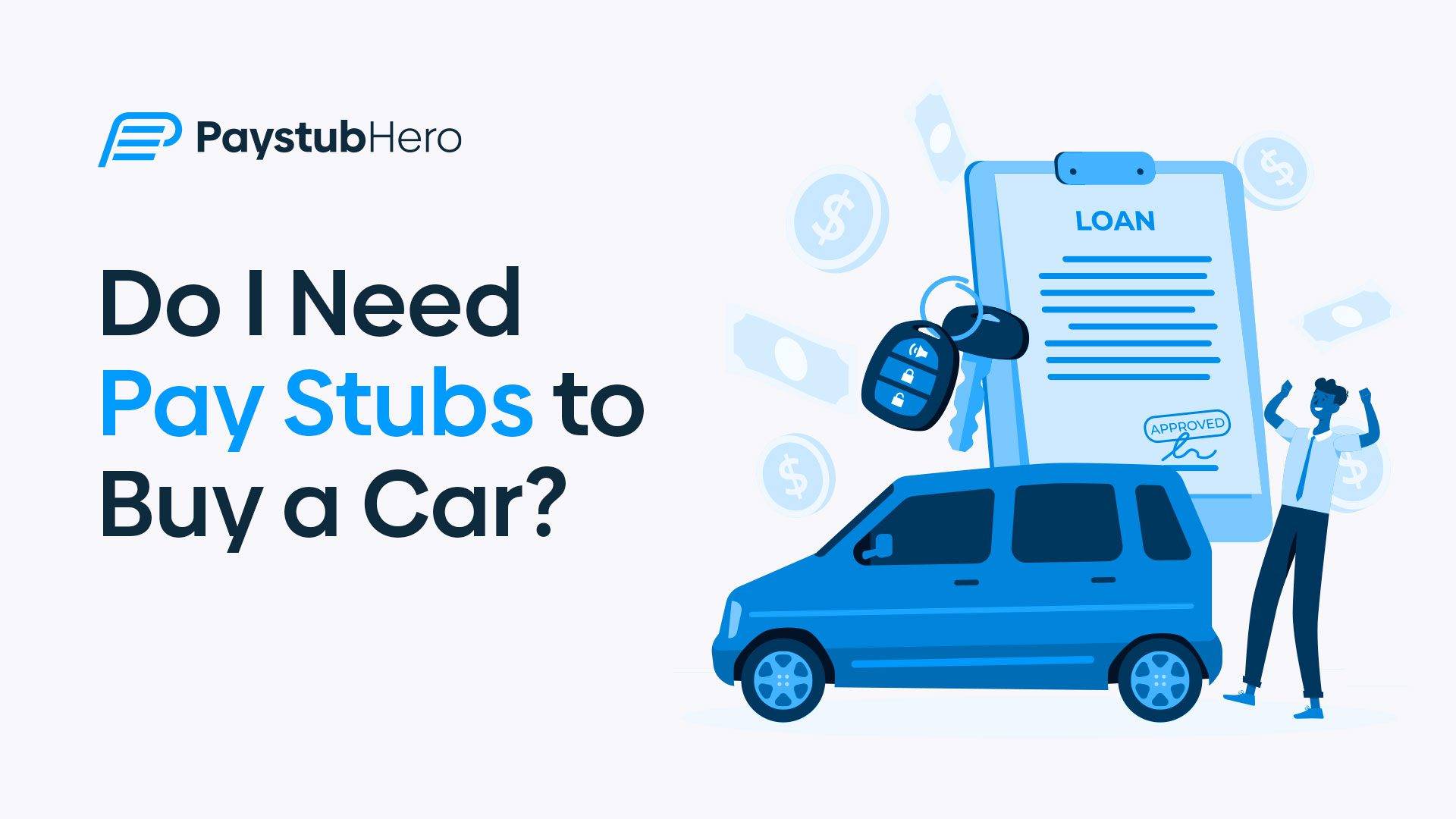Car buying – it’s an exciting endeavor, but one that often comes with a flurry of questions. From deciding the type of car you want to understanding the financing options available, every step of the journey invites a new query.
One of the most common concerns, particularly for first-time buyers, centers around the nitty-gritty of documentation. Specifically, the question we hear over and over again is, “Do I need pay stubs to buy a car?”
In the context of buying a car, whether it’s a sleek new sports model or a reliable used sedan, these seemingly mundane documents can play a significant role. So, to address the question head on: Do you need pay stubs to buy a car? The short and simple answer is, yes.
Pay stubs, those unassuming slips of paper that arrive alongside your paycheck, hold far more significance than you might think, especially when it comes to making big purchases. They serve as a passport of sorts into the world of finance, offering tangible proof of your income and your ability to meet financial commitments.
The rest of this article will delve deeper into why pay stubs are important, what alternatives exist if you don’t have them, and other factors to consider in the car buying process.
But before we embark on this journey, let’s remember that every financial decision is a stepping stone towards our dreams. So, buckle up and let’s navigate this road together.
Why Pay Stubs Matter: Unpacking Their Role in Your Car Buying Journey
When it comes to buying a car, pay stubs are more than just pieces of paper. They are a testament to your financial stability and a passport to securing the car of your dreams. Understanding their importance is the first step on the road to car ownership.
So why do pay stubs matter so much? Well, they serve a dual purpose. Not only do they act as concrete proof of your income, but they also demonstrate your ability to handle ongoing car payments – a crucial factor that lenders consider when deciding whether or not to approve an auto loan.
Consider the findings of a 2021 report from Experian, a global leader in consumer and business credit reporting.
It revealed that a whopping 86.3% of new car purchases and 55.5% of used car purchases were financed. These statistics clearly highlight the significance of being able to establish your financial standing when you’re planning to purchase a car.
In essence, pay stubs act as a financial “snapshot”, offering lenders a quick and comprehensive view of your earnings. They are a key component of the car buying process and understanding their importance can pave the way for a smoother, more successful journey to car ownership.
Pay Stubs Unveiled: An In-Depth Look at their Critical Role in Car Buying
To truly appreciate the impact of pay stubs in your car-buying journey, it’s essential to delve a little deeper into what they represent and why lenders give them so much weight.
On the surface, pay stubs may seem like simple documents, but they’re powerful tools in demonstrating your financial capabilities.
When lenders – be they banks, credit unions, or car financing companies – evaluate your loan application, they’re essentially assessing risk. They want to know, with some degree of certainty, that you’re capable of making regular payments over the agreed-upon term of the loan.
This is where your pay stubs come into play. They’re your financial “thumbprint” that offers lenders this assurance.
These humble documents provide a wealth of information. They outline your gross income, any deductions for taxes, healthcare, or retirement savings, and ultimately, your net income – the amount you take home.
This breakdown is instrumental in helping lenders determine your debt-to-income ratio, a critical factor in loan approval.
Your debt-to-income ratio represents the percentage of your gross monthly income that goes towards paying debts. The lower this ratio, the more financially capable you appear in the eyes of lenders, thus boosting your chances of securing that coveted auto loan.
Simply put, pay stubs act as a financial health check, a clear indicator of whether you’re ready and able to take on the financial commitment of buying a car. They’re the supporting documents that can help transform your dreams of car ownership into reality.
The Pay Stub Puzzle: Navigating Car Buying Without Traditional Income Proof
So, what happens when traditional pay stubs aren’t part of your financial portfolio? Perhaps you’re self-employed, work as a freelancer, or fall into another category where regular pay stubs aren’t the norm.
Does this mean you’re left standing on the roadside of the car-buying journey? Absolutely not.
While it’s true that pay stubs are a common form of income verification, they’re not the only way to demonstrate your earnings. In fact, there are several alternatives to consider that can help you illustrate your financial stability to potential lenders.
If you’re a self-employed professional or freelancer, your tax returns can be a viable substitute for pay stubs. These documents offer a comprehensive view of your annual income and can showcase a consistent earning pattern.
Similarly, bank statements, reflecting regular deposits, can serve as evidence of steady income. Freelancers can even use invoices or contracts to demonstrate their earning capabilities.
The key here isn’t necessarily the type of documentation but the story it tells. Lenders are looking for evidence of consistent and reliable income over time, regardless of its source.
Your aim is to quell any concerns lenders might have about your ability to meet regular car payments.
Therefore, even if traditional pay stubs aren’t part of your picture, there’s no need to hit the brakes on your car-buying plans.
With a little creativity and some alternative documentation, you can keep your dreams of car ownership in the fast lane.
Harnessing the Power of Your Credit Score: An Alternative Route in Your Car Buying Journey
As we traverse the car buying landscape, it’s essential to understand all the tools at your disposal. One such tool, often overlooked but incredibly powerful, is your credit score.
While we’ve established the importance of pay stubs or other income verification, your credit score can also play a pivotal role in securing a car loan.
Your credit score is a numerical representation of your creditworthiness, based on your history of managing debt and making payments on time. It’s like a financial report card that lenders use to assess the likelihood of you repaying your debts.
A high credit score can sometimes compensate for a lack of pay stubs and make the car buying journey a smoother ride.
Consider the findings of a 2022 study conducted by Credit Karma, a personal finance company.
According to their research, a credit score of 700 or above can significantly improve your chances of securing an auto loan. The rationale behind this is simple – a high credit score indicates financial responsibility, making lenders more comfortable with the idea of extending credit.
But how does this tie into our conversation about pay stubs?
Essentially, if your credit score is strong, lenders may be more flexible about the documentation required. They’re more likely to trust your ability to repay the loan, even in the absence of traditional pay stubs or other income verification.
Therefore, nurturing a strong credit score can be an advantageous strategy in the car buying process. Not only can it boost your chances of loan approval, but it can potentially offer more negotiating power and better interest rates.
In short, your credit score is a potent tool, so leverage it wisely on your journey to car ownership.
Charting Your Course: An Actionable Plan for Navigating the Car Buying Process
Now that we’ve explored the role of pay stubs and the power of a strong credit score in the car buying process, it’s time to piece together an action plan.
After all, understanding the terrain is just the first step – you also need a roadmap to navigate it successfully.
Whether you’re a first-time car buyer or a seasoned veteran, the process can be both exciting and daunting. It’s not just about choosing the right car; it’s also about understanding the financial implications and preparing accordingly.
Here’s a step-by-step guide to help you steer through the process with confidence:
- Gather Your Documents: Your first port of call should be to collect all necessary documents. This includes pay stubs or alternative proof of income, ID, and proof of residence. Remember, the goal is to provide lenders with a comprehensive picture of your financial health and stability.
- Check Your Credit Score: This is a critical step. Knowing your credit score will give you a clear picture of your standing in the eyes of potential lenders. It can also help you anticipate any challenges you might face during the loan approval process.
- Shop Around: Don’t rush into the first deal that comes your way. Take your time to compare rates and conditions from different lenders. This due diligence can ensure you secure the best deal possible, one that aligns with your financial capabilities and goals.
- Keep Communication Open: If you’re lacking certain documents or facing challenges, don’t hesitate to talk to potential lenders. They may be able to provide alternatives or workarounds, or guide you towards a solution that suits your situation.
Remember, buying a car is a significant financial commitment, and preparation is key. By following these steps, you can transform what might seem like a daunting process into a manageable and even enjoyable journey.
So yes, you do need pay stubs to buy a car, or at least some form of income verification. But with the right preparation, clear communication with your lender, and a strong understanding of the process, you can navigate your car buying journey with confidence and ease.
Here’s to successful journeys and happy car shopping!








